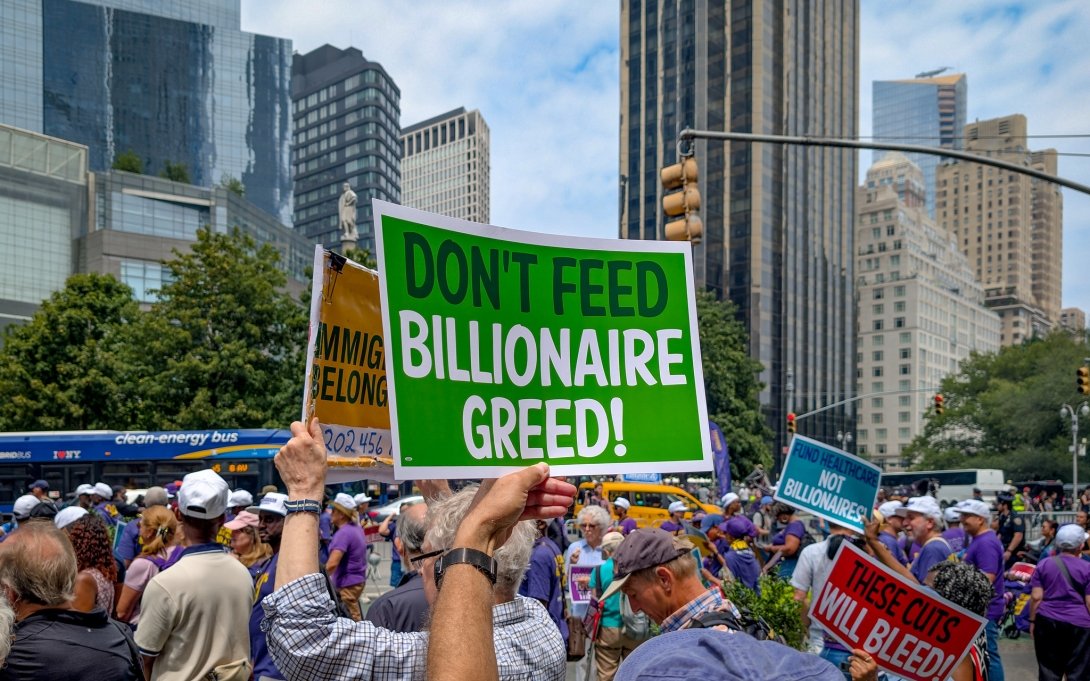The Making of Free Press’ Media Capitulation Index

Protesters gather outside Trump International Hotel in New York City. July 2025.
Timothy Karr
After six months of research, writing and … um … rewriting, Free Press on July 29 released the inaugural Media Capitulation Index. This sweeping investigation analyzes and rates the independence of America’s 35 largest media companies, including the many conglomerates that have recently caved to pressure from an authoritarian and corrupt Trump administration.
I led the investigation, produced the performance-based ratings of these companies and authored the report, A More Perfect Media: Saving America’s Fourth Estate from Billionaires, Broligarchy and Trump, which accompanies the index.
The findings are sobering. After digging into the many failures of America’s hyper-commercialized media system, we present a series of recommendations to help dig the United States out of our current mess and build toward a more independent, democratic, diverse and free press.
This work is crucial at a time when some of the most dominant news media companies empires including Disney (which owns ABC), Paramount (CBS) and Warner Bros. Discovery (CNN) are capitulating and compromising in the face of this administration’s political extortion and thuggery. In addition, The New York Times is becoming increasingly “vulnerable” to pressure from the White House.
The index also investigates the questionable and often lucrative government entanglements of billionaire media owners like Jeff Bezos, Mark Zuckerberg and Elon Musk.
In evaluating the 35 companies, Free Press found that media owners capitulated to the current White House in four principal ways:
- through payments to Trump in the form of legal settlements, production contracts, campaign contributions and other donations;
- by rolling back prior commitments to diversity, equity and inclusion practices in hiring and community outreach;
- through editorial manipulation and censorship: pressuring their newsrooms to soften criticism of the administration, firing staff and even pulling content that might anger the president; and
- by attempting to curry favor with the president during inaugural ceremonies, private dinners at Mar-a-Lago and meetings in the White House.
Fulfilling the social compact
This small cartel of billionaire- and equity-fund-controlled conglomerates determines much of what Americans read, see and hear. Their coverage and amplification too often sets the agenda around nation-defining political issues. Through a history of mergers and acquisitions, these companies have consolidated their control over public discourse.
Our founders sought to protect the U.S. press from government meddling so that reporters and publishers could act as reliable checks against tyranny and other political corruption. But it’s up to the media to exercise these freedoms. Many modern-day media owners, instead, have put their pursuit of power and profits over First Amendment principles.
I can’t imagine that the drafters of the Constitution foresaw a time when so much control over information would fall into the hands of so few. We need to examine the systemic failures that have led us to this point and understand how such accumulation of power and wealth makes it next to impossible for these media giants to fulfill the social compact embodied in the notion of the Fourth Estate.
I spoke with former New York Times Public Editor Margaret Sullivan, who later wrote the Free Press project was a “thorough new examination of how well — or poorly— the American press is doing that core mission. And why it’s mostly failing.”
Each conglomerate in the Media Capitulation Index is ranked on a scale from “independent” to “propaganda.” The report analyzes the root causes driving commercial media’s inability to defend democracy at a time of spreading domestic and international authoritarianism.
Please take a moment or two to visit the Media Capitulation Index and read A More Perfect Media.
Who owns the media owners?
As I was writing, researching and creating these materials, many people asked me: “Who owns the media?” The Media Capitulation Index helps answer that question, but it also raises an even more essential (and disturbing) one: “Who owns the media owners?”
The report that accompanies the index reveals the systemic problems behind the media’s failure to meet this moment. But it concludes on a more hopeful note, outlining steps people can take to make “a more perfect media” for everyone. These include fully funding public media and independent, local-accountability journalism; restoring and strengthening media-ownership limits; and emboldening the FCC’s and FTC’s role in stopping media mergers that harm the public interest.
We will continue to update the index, capturing both instances of media capitulation and examples where media stand up to this extortionate regime. Stay tuned and join the fight!
###
Help Free Press Action keep working to build a more democratic and independent media: Donate today.